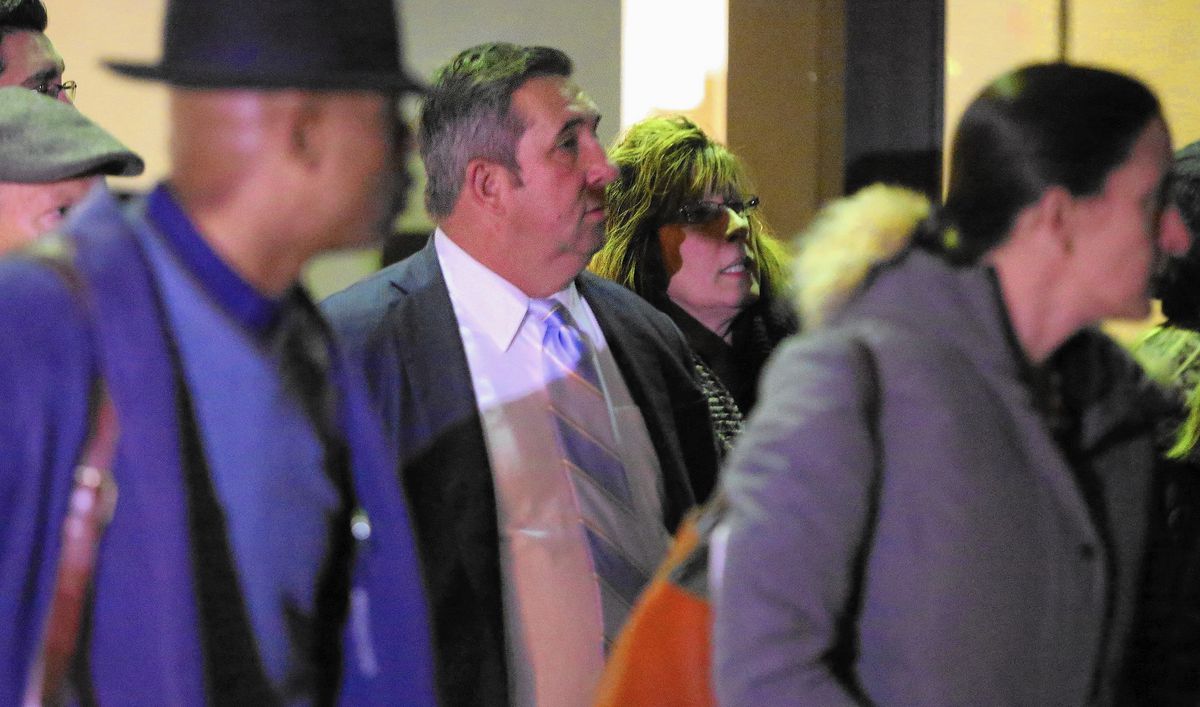Chicago police Officer William Pruente, center, leaves the Leighton Criminal Court Building with family and supporters Dec. 7, 2016. (Antonio Perez / Chicago Tribune)
BY Patrick M. O’Connell
Chicago Tribune
Drawing a distinction between “knowingly false” statements and mistakes, a Cook County judge handed out split verdicts Wednesday in the perjury trial of three police officers accused of lying about the circumstances of a drug arrest.
One Chicago police officer was found guilty of felony perjury, obstruction of justice and official misconduct. But his supervisor and a Glenview officer who assisted during the 2013 arrest were acquitted.
The distinction, the judge said, was that Chicago police Officer William Pruente knew his filed police report and subsequent testimony during a 2014 hearing were not correct. Pruente, Judge Matthew Coghlan said, purposely re-ordered the sequence of events, claiming he handcuffed the suspect after finding drugs. The other officers there that day relied on Pruente’s report and summary, the judge determined, letting them off the hook.
Chicago police Sgt. James Padar, Pruente’s supervisor on a narcotics investigation team, and James Horn, a former Glenview patrol officer who assisted with the traffic stop at the center of the case, were found not guilty.
Prosecutors argued the case was a clear fabrication designed to streamline the account of the arrest, in essence violating Joseph Sperling’s constitutional right against unreasonable searches. The defense characterized its clients’ actions as the simple errors of harried police officers who jumbled the order of what happened that day.
Pruente’s false report and statements were discovered when a defense attorney for Sperling played video footage from one of the Glenview police cars at the traffic stop. Footage of the event did not match the officers’ testimony at a March 31, 2014, hearing to quash Sperling’s arrest. The judge at the hearing ordered Sperling released, and prosecutors launched an investigation.
Pruente wrote in his report, and the officers detailed at the hearing, that he asked Sperling for his driver’s license and registration, then spoke with him for about a minute before asking him to step out of the car so he could search his vehicle for cannabis. But the video showed Sperling was almost immediately ordered out of the car and handcuffed. Police recovered a bag packed with about a pound of marijuana and also drugs known as mushrooms.
One other officer who testified incorrectly at the hearing, Vince Morgan, pleaded guilty in September to a misdemeanor count of obstruction of justice and was sentenced to a year of probation.
The Glenview officer whose squad-car video revealed the false testimony, former Sgt. Theresa Urbanowski, was on the stand when the video was played and she was able to correct her testimony. Urbanowski took the stand in the trial Monday, calling her former co-worker, Horn, “one of the most honest” officers she’s known.
Pruente shook his head, then dropped it toward the ground upon hearing the verdict, which the judge issued after a 25-minute deliberation in chambers. Pruente cried with family members and hugged them inside the courtroom. He left the Leighton Criminal Court Building without speaking to reporters. A Jan. 3 post-trial hearing was set. He faces a sentence that ranges from probation to five years in prison.
Padar, who has been suspended from the department, also left the courthouse without taking questions.
But Horn said he was relieved by the verdict. He was found not guilty after defense lawyers asked the judge for a directed verdict, arguing there was not enough evidence of guilt. Horn said he was happy to put the case behind him after thinking about it every day for the past three years. Horn, fired from the Glenview force after administrative proceedings, said he hoped the acquittal would help restore his reputation.
Horn’s lawyer, Dan Herbert, said he was “ecstatic” for Horn and felt from the start that the charges against Horn were weak.
“It’s dangerous to start criminalizing mistakes made by police,” Herbert said. “The line between intentional misconduct and mistakes seems to be blurring.”
Coghlan said Horn was mostly a bystander during the arrest, and it appeared his testimony was based on a review of one of the Chicago officer’s reports. His statements in court that day were vague and showed he did not clearly remember the sequence of what happened, the judge said.
Likewise, the judge said Padar’s testimony may have been “factually inaccurate” but there was not enough evidence to prove he was making “knowingly false” statements, the burden for perjury and the subsequent misconduct charges.
Neither Padar nor Pruente testified during the trial, which took the better part of two days.
The officers’ trial comes weeks after Cook County prosecutors dropped charges against the men in a previous trial because the indictment had been brought under an out-of-date state statute. Prosecutors refiled the charges using the appropriate law.
The judge’s ruling in a criminal case involving police officers as defendants comes after former Chicago police Cmdr. Glenn Evans, who was charged in 2014 with aggravated battery and official misconduct for allegedly shoving his gun down a man’s throat, was acquitted a year ago by a Cook County judge despite evidence showing the alleged victim’s DNA was on Evans’ gun.
And a judge cleared Chicago police Detective Dante Servin in April 2015 of involuntary manslaughter, saying prosecutors should have charged him with first-degree murder. An innocent bystander was killed when Servin fired his gun into a crowd in an off-duty encounter near his home in 2012.
Sperling, the target of the police officers that day, now faces charges of reckless homicide, aggravated driving under the influence and leaving the scene of a fatal crash for his alleged role in a September crash that killed one woman. Police said Sperling was under the influence of alcohol when he drove his black Lexus at a high rate of speed, struck another car along Golf Road in Morton Grove and ran from the scene. The Aug. 26 crash split the other car in two, instantly killing driver Denise Cavada, 48, of Chicago, who had been on her way home after an evening of playing bingo, authorities said.
Cavada’s mother, Merrilee Jaimes, blamed authorities for letting Sperling’s initial arrest for drugs fall apart.
“If they hadn’t have let him go,” she said in September, “my daughter wouldn’t be dead.”



